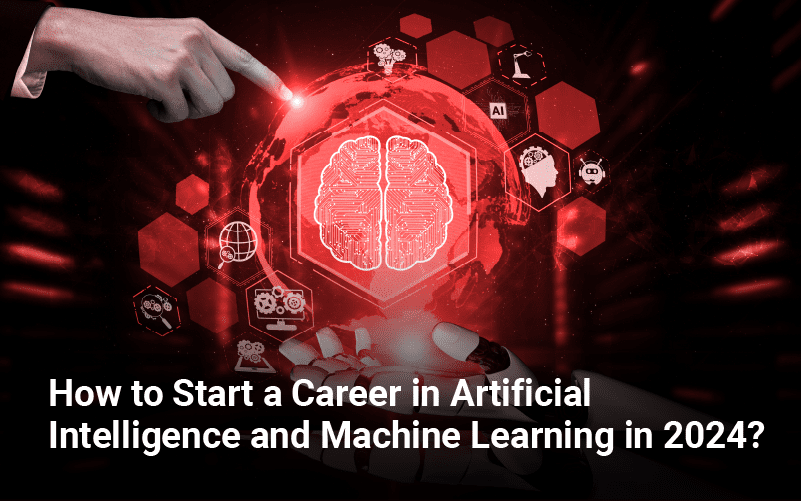A career in artificial intelligence has never been more exciting. In recent years, the global advancement of technologies has gained increased significance due to their contribution to the digital landscape. The development of data accessibility and algorithms has further led to a remarkable surge in the artificial intelligence and machine learning industries, redefining industries and revolutionizing how we interact with technology.
From healthcare to transportation, AI and ML professionals are driving innovation across industries, leading to a surge in demand for skilled professionals. Understanding AI and ML is a reliable route to a fulfilling profession with room for continued advancement, with a projected growth rate of 23% by 2032 (BLS, 2023). This blog explores the significance and promising prospects of careers in AI and Machine Learning.
Understanding Artificial Intelligence and Machine Learning
AI can be understood as simulated human intelligence that performs all the tasks similar to how a human would think and do. Relying on sophisticated algorithms, artificial intelligence imitates human behaviors, including planning and reasoning, enabling tasks like automating mundane tasks to address complex challenges.
Machine Learning is a subset of AI that enables software systems to learn and improve from data without explicit programming. Machine learning algorithms are the foundation for a multitude of applications, including language translation tools, chatbots, and personalized content curation. Imagine the possibilities when technology can understand and respond to human needs. Moreover, machine learning is used by the majority of industries in various capacities, from driving autonomous vehicles to diagnosing medical conditions through images.
Although they are connected, machine learning and artificial intelligence are two different fields. Both offer promising career opportunities and growth.
Skills Required for AI and ML Careers
As essential as it is to understand the significance of artificial intelligence and machine learning and their rising demands, so is to know the diverse skill set needed for AI/ML careers. Here are some of the key skills alongside some additional skills that enable candidates to stand out of the curve, meeting the rising demands of this dynamic field:
Key technical competencies:
- Programming languages :
In the vast field of AI and ML, proficiency in programming languages holds significant importance. Python, TensorFlow, PyTorch, and sci-kit-learn are among the languages you can be familiar with. Further, C++ and Java can also be helpful, depending on the area of artificial intelligence that one decides to work in. - Strong Knowledge of Math :
Ensure you have hands-on critical mathematics concepts, including statistics, calculus, probability, linear algebra, etc. Knowledge of these concepts enables you to understand how machines learn from data. - Data Management and Data Science :
Large data sets are necessary for AI training and testing, so you’ll need to be skilled in data collection, storage, and manipulation. Database management and data preprocessing are also essential for managing the data that drives AI models. In today’s data-driven world, data ethics and privacy are also critical because AI professionals frequently need to have a strong understanding of data science, which includes statistical analysis, hypothesis testing, and experimentation. - Reinforcement learning :
Reinforcement learning is a branch of ML that focuses on training agents to make sequential decisions in dynamic environments. Proficiency in reinforcement learning algorithms and frameworks like OpenAI Gym and RLlib is essential for applications such as autonomous robotics, game playing, and resource management. - Knowledge of cloud computing platforms (AWS, Azure, etc.) :
With the increasing adoption of cloud computing in AI and ML projects, familiarity with platforms like AWS (Amazon Web Services), Azure, and Google Cloud Platform is highly beneficial. Skills in deploying, scaling, and managing AI solutions on cloud infrastructure enable professionals to leverage the scalability, flexibility, and cost-effectiveness of cloud computing for their projects. - Specialized Degree Programs :
You might want to explore getting a bachelor’s degree in data science, Artificial intelligence, computer science, machine learning, or a related field. This will provide a comprehensive understanding of AI and ML concepts. Master’s degrees like a Master’s of Science in Cyber security or specialized certifications can further enhance your expertise and open doors to advanced roles. Around 3,400 jobs become available for computer and information research scientists every year. This trend is expected to continue for the next ten years (Bureau of Labor Statistics, 2023)
Understanding How to Make a Career in Artificial Intelligence
There are several paths to an amazing career in artificial intelligence and machine learning, each with varying educational requirements. The proliferation of AI and ML products has fueled a data revolution. Businesses now leverage these technologies to process and analyze massive datasets, enabling them to make more informed decisions, generate real-time recommendations and insights, and develop accurate forecasts and predictions.
With a solid foundation and practical experience, you are ready to explore career options. Here are some exciting possibilities:
- Machine Learning Engineer: The architects of the AI world, Machine Learning Engineers design, develop, and deploy machine learning models to solve specific problems. They translate business needs into technical requirements, work closely with data scientists to prepare and analyze data, and build robust models that can learn and improve over time. The median salary in the US is $165,199 (Indeed, 2024).
- Data Scientist: Data Scientists are the detectives of the data world. They use their analytical skills and programming expertise to extract insights from vast datasets. They identify patterns, build models to predict future outcomes, and communicate their findings to stakeholders to inform business decisions. The median salary in the US for a Data Scientist is $126,997 (Indeed, 2024).
- AI Researcher: Pioneering the future of AI, AI Researchers push the field’s boundaries by developing new algorithms and applications. They conduct cutting-edge research, experiment with innovative techniques, and contribute to advancing AI theory and practice. This path usually requires a Ph.D.
- AI Ethicist: As AI becomes more integrated into society, the role of the AI Ethicist becomes increasingly essential. They ensure the responsible development and deployment of AI systems, considering ethical implications like fairness, bias, and privacy. AI Ethicists work across various stages of the AI lifecycle, from design and development to implementation and monitoring.
The journey to machine learning and artificial intelligence career paths is a continuous process. Embrace the challenge, leverage the vast online resources available, and don’t be afraid to experiment. You can shape the intelligent future powered by AI and ML with dedication and passion. Ready to take the first step? Explore online courses, attend workshops, or contribute to open-source projects to ignite your AI/ML adventure!
References:
• Bureau of Labor Statistics. (2024). Computer and Information Research Scientists. https://www.bls.gov/ooh/computer-and-information-technology/computer-and-information-research-scientists.htm
• Indeed.com. (2024, April 22). Data scientist salary in United States. https://www.indeed.com/career/data-scientist/salaries
• Indeed.com. (2024, April 22). Machine learning engineer salary in United States. https://www.indeed.com/career/machine-learning-engineer/salaries








